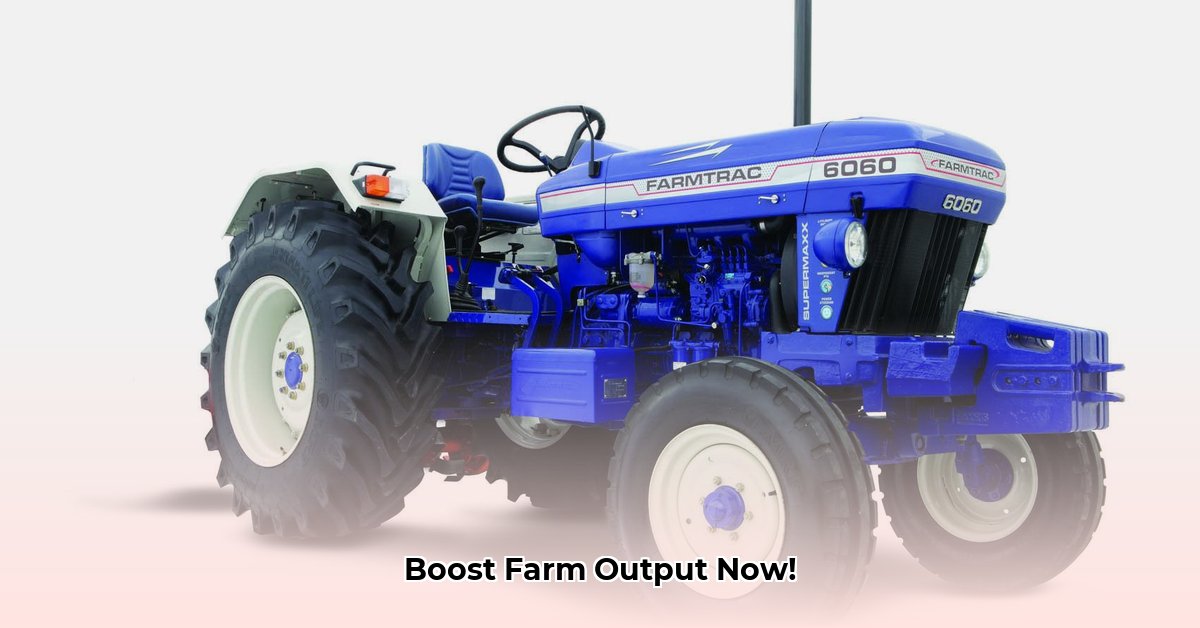
Escort Tractors: Powering a Greener Future in Farming
Escorts Kubota Limited (EKL) is a major player in the Indian agricultural machinery market, with its Escort tractors playing a significant role in the country's farming landscape. But how does EKL's approach contribute to both increased farm output and environmental sustainability? This article analyzes EKL's strategies, focusing on key performance indicators (KPIs) and stakeholder impact, while acknowledging the need for further data to fully quantify certain aspects. How effective are EKL's efforts in promoting sustainable agriculture? Let's examine the evidence. For a different approach to sustainable farming, check out this guide on building a chicken tractor.
EKL's Plan for Sustainable Farming: A Holistic Approach
EKL's strategy extends beyond simply manufacturing and selling tractors. It encompasses a holistic approach to sustainable agriculture, focusing on three key pillars: technologically advanced tractors, operational efficiency, and environmentally conscious manufacturing practices. This integrated strategy aims to increase yields while minimizing the environmental footprint. Is this ambitious goal achievable? While comprehensive data on specific emission reductions and water usage are currently lacking, the 2024 merger of Kubota Agricultural Machinery India Pvt Ltd and Escorts Kubota India Pvt Ltd into EKL signals a serious commitment to innovation and technological advancement within the sustainable agriculture sector.
The Escort Tractor's Role: Enhancing Efficiency and Productivity
Escort tractors are central to EKL's strategy. Designed for efficiency and versatility, these machines allow farmers to cover larger areas in shorter periods, directly boosting overall productivity. Improved fuel economy translates into significant cost savings for farmers, enhancing both profitability and the long-term sustainability of their operations. But how much fuel do these tractors actually save compared to older models? Further quantified data is necessary to fully support these claims. Beyond the tractors themselves, EKL provides training and support to farmers, fostering the adoption of sustainable farming practices. This comprehensive approach positions EKL not just as a supplier, but as a strategic partner in farmers' success.
Challenges and Opportunities: Navigating the Path to Sustainability
Despite EKL's achievements, challenges remain. Past difficulties experienced by their North American subsidiary underscore the complexities of international market expansion. Successfully navigating diverse global markets requires meticulous strategic planning and adaptive capabilities. Moreover, balancing resources and expertise across various business segments (tractors, construction, railway equipment) presents a managerial challenge.
The future success of EKL, and the broader sustainable agriculture sector, hinges on several key factors:
Technological Innovation: Continued investment in R&D (research and development) of fuel-efficient and environmentally friendly technologies, including the exploration of alternative fuels (biofuels, hydrogen) and precision farming techniques, is paramount.
Market Expansion: Increasing EKL's presence in developing countries and building robust, globally integrated supply chains are critical for long-term growth and stability.
Enhanced Data Transparency: More detailed and publicly available reporting on environmental KPIs (key performance indicators) will create greater investor confidence and attract capital focused on sustainable business practices.
Stakeholder Impact: A Multifaceted Analysis
EKL's sustainable farming solutions positively impact a wide range of stakeholders:
| Stakeholder | Short-Term Impact | Long-Term Advantages |
|---|---|---|
| Farmers | Increased efficiency, reduced costs, higher yields | Improved farming practices, enhanced profitability, access to advanced technologies |
| Investors | Strong financial returns, improved ESG ratings | Significant growth potential in a rapidly expanding market |
| Escorts Kubota Ltd. | Market share growth, enhanced brand reputation | Leadership in sustainable agricultural technology, robust business model, higher earnings |
| Environment | Reduced emissions, improved resource management | Mitigation of climate change, preservation of natural resources |
Measuring the Environmental Impact: A Case Study of Escorts Kubota Tractors
Escorts Kubota's operations, while crucial to agricultural productivity, inevitably leave an environmental footprint. A comprehensive assessment requires a lifecycle assessment (LCA) approach, encompassing the entire lifecycle of a tractor from raw material sourcing to end-of-life management. Key areas for data collection include:
Manufacturing Emissions: Quantifying greenhouse gases (GHGs), air and water pollutants from production processes.
Operational Emissions: Measuring fuel consumption per hectare, fuel type, and engine efficiency in various farming contexts.
Soil Degradation: Assessing soil compaction levels and crop yields in relation to tractor usage.
Material Sourcing: Evaluating the environmental footprint of the supply chains for raw materials.
End-of-Life Management: Determining recycling rates and waste disposal volumes.
This data-driven analysis, paired with transparency and improved reporting, will lead to a more comprehensive understanding of EKL's environmental impact. Technological advancements, including alternative fuel technologies and precision agriculture techniques, are crucial for minimizing this impact.
The future of sustainable agriculture depends on collaborative efforts among manufacturers, farmers, governments, and consumers. By embracing transparency, investing in innovation, and adopting responsible farming practices, we can pave the way towards a more ecologically responsible and productive future.